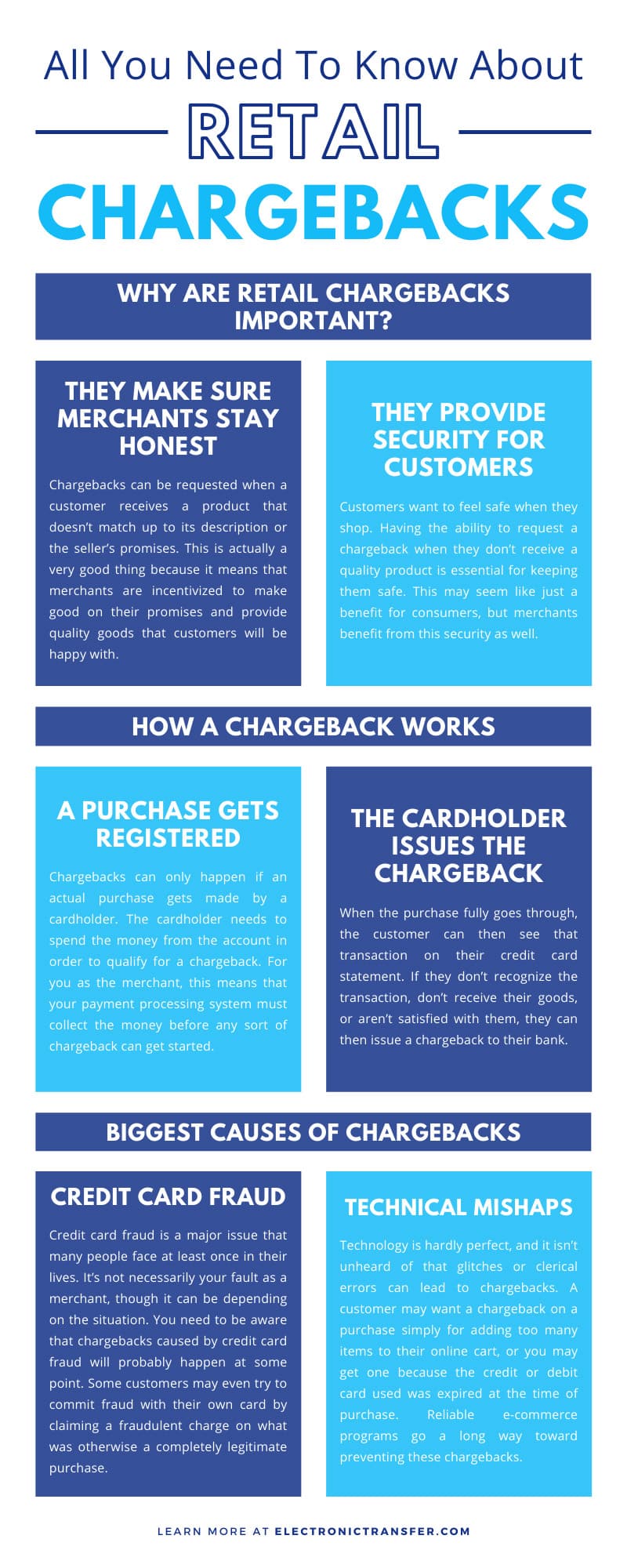All You Need To Know About Retail Chargebacks
Mitchell Reed | Posted on |


When it comes to unplanned expenses that many retailers have to deal with, chargebacks are no joke. Retail chargebacks are common for many businesses, and it doesn’t matter what industry you are in or what you happen to sell. New business owners can often find themselves surprised by the number of retail chargebacks they have to deal with on a regular basis. Many amateur business owners aren’t even aware of what a retail chargeback is or how it affects their bottom line.
We here at Electronic Transfer deal with retail chargebacks rather frequently, and we know how frustrating they can be for business owners, especially ones that are trying to get their stores off the ground. In this article, we’ll go over all you need to know about retail chargebacks so you have a better idea of what they are and how they pop up. This knowledge should help you make better-informed decisions in the future about how you process your electronic transactions.
What Exactly Is a Retail Chargeback?
If you want to figure out everything you need to know about retail chargebacks, it’s important to start with a solid understanding of what the term refers to in the first place. A chargeback occurs when a cardholder asks their bank to undo a transaction that they don’t recognize on their statement for whatever reason. You can also think of this as a “payment dispute” since the cardholder is disputing their bank on the validity of a transaction on their statement.
Why Are Retail Chargebacks Important?
Despite being annoying to deal with for business owners, retail chargebacks are very important for people to be able to do. Besides the fact that they help recover money that the cardholder never actually spent, the presence of chargebacks offers some extra benefits for consumers. Without chargebacks, the landscape of purchasing would be a lot more treacherous for consumers.
They Make Sure Merchants Stay Honest
Chargebacks can be requested when a customer receives a product that doesn’t match up to its description or the seller’s promises. This is actually a very good thing because it means that merchants are incentivized to make good on their promises and provide quality goods that customers will be happy with. Disreputable merchants could easily take advantage of people if the threat of chargebacks wasn’t something they had to consider.
They Provide Security for Customers
Customers want to feel safe when they shop. Having the ability to request a chargeback when they don’t receive a quality product is essential for keeping them safe. This may seem like just a benefit for consumers, but merchants benefit from this security as well. A customer who feels safe in their ability to spend money is more likely to spend that money rather than be overly conservative.
How a Chargeback Works
Chargebacks require cooperation from multiple banks, the cardholding customer, and the merchant in order to go through correctly. Here’s a basic overview of how they tend to pan out.
A Purchase Gets Registered
Chargebacks can only happen if an actual purchase gets made by a cardholder. The cardholder needs to spend the money from the account in order to qualify for a chargeback. For you as the merchant, this means that your payment processing system must collect the money before any sort of chargeback can get started.
The Cardholder Issues the Chargeback
When the purchase fully goes through, the customer can then see that transaction on their credit card statement. If they don’t recognize the transaction, don’t receive their goods, or aren’t satisfied with them, they can then issue a chargeback to their bank. Customers usually need some kind of proof of purchase if they want a chargeback on goods they actually did receive.
Merchant and Issuing Banks Communicate
Once the chargeback gets filed, the customer’s bank will contact the merchant’s bank about the dispute. The merchant’s bank will need to verify that the transaction actually took place at the same time as the customer’s bank provides the reasoning behind the chargeback request. If the merchant’s bank determines that the chargeback claim is accurate after investigation, they will issue the money back to the customer.
Biggest Causes of Chargebacks
There are plenty of reasons for people to ask for a chargeback. Some of them are serious offenses that could point to serious credit card fraud or other crimes. On the other hand, sometimes, a simple misunderstanding can lead to a chargeback being requested as well. Here are some of the most common reasons people want chargebacks.
Credit Card Fraud
Credit card fraud is a major issue that many people face at least once in their lives. It’s not necessarily your fault as a merchant, though it can be depending on the situation. You need to be aware that chargebacks caused by credit card fraud will probably happen at some point. Some customers may even try to commit fraud with their own card by claiming a fraudulent charge on what was otherwise a completely legitimate purchase.
Technical Mishaps
Technology is hardly perfect, and it isn’t unheard of that glitches or clerical errors can lead to chargebacks. A customer may want a chargeback on a purchase simply for adding too many items to their online cart, or you may get one because the credit or debit card used was expired at the time of purchase. Reliable e-commerce programs go a long way toward preventing these chargebacks.
Shipping Problems
You can’t always control if items arrive exactly when they should. If something goes wrong during shipping and the customer doesn’t receive what they ordered, they are entitled to request a chargeback for their missing items.
Subscription Issues
More common nowadays are chargebacks caused by recurring subscriptions. The customer may not realize that the subscription renews on its own, and they may want to cancel their subscription even after the renewal has gone through.
Preventing chargebacks can be a hassle on your own, which is why you need a payment processing company you can trust, like Electronic Transfer. We specialize in being a high-risk credit card processing company that merchants can rely on to have their backs in these situations.



